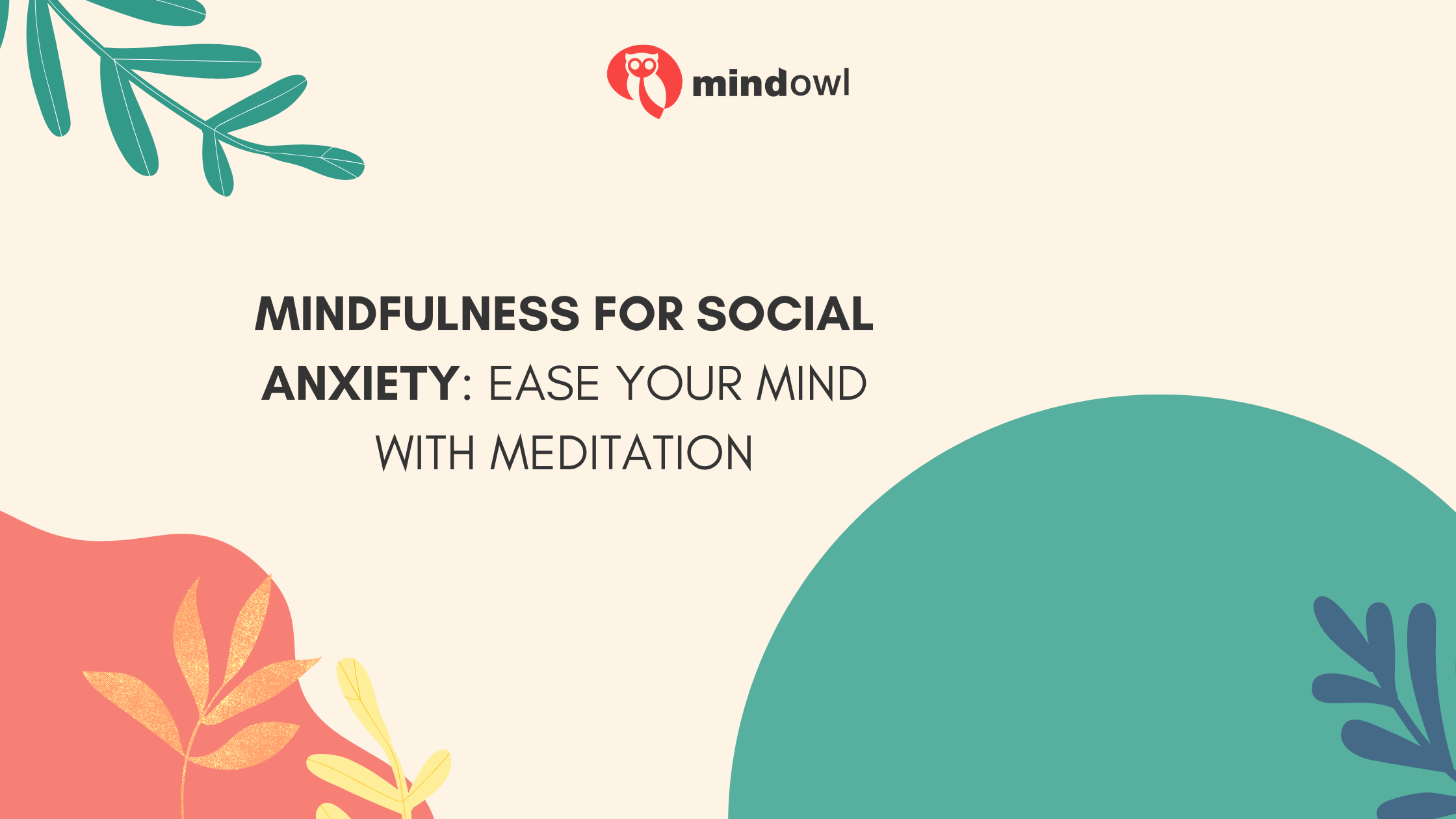Feeling jittery about striking up a conversation or walking into a crowded room might seem like just another day for someone with social anxiety. It’s that butterfly-in-the-stomach feeling, but not the good kind—it can stop you in your tracks, making even the simplest social interaction feel like an impossible task.
Here’s an interesting fact: regular meditation can help decrease those overwhelming feelings of anxiety, including the ones that make social situations so hard.
This blog post is here to guide you through using mindfulness and meditation as tools to ease your mind and manage social anxiety effectively. From understanding how mindfulness works to introducing practical meditation techniques designed specifically for those with social phobia, we’re covering it all.
Ready to find some peace of mind? Keep reading.
Key Takeaways
- Mindfulness meditation helps people with social anxiety by focusing on the present moment. This reduces worry about past or future events.
- Regular mindfulness practice can lower physical symptoms of social anxiety, like a racing heart and sweating. It also makes you feel more at ease in social situations.
- Starting meditation involves finding a quiet spot, setting a time limit for practice, and focusing on your breath. Consistency is key to seeing benefits.
- Techniques such as sitting meditation, body scan, and deep breathing are effective for easing social anxiety. They help calm the mind and reduce stress.
- Studies show that mindfulness meditation significantly improves symptoms of anxiety and mood in individuals with social anxiety disorders.
Understanding Social Anxiety

Social anxiety disorder makes people feel anxious in social settings. They worry about being judged, embarrassed, or rejected by others. This fear can be so strong that it stops them from going to work or school.
It might even make it hard for them to do everyday things like shopping or speaking on the phone.
Mindfulness meditation helps a lot with this problem. It teaches people how to focus on the present moment instead of worrying about the past or future. This can calm their mind and make social situations less scary.
Mindfulness also helps them understand and manage their thoughts and feelings better, reducing symptoms of social anxiety over time.
Mindfulness and its Role in Alleviating Social Anxiety
Mindfulness helps alleviate social anxiety by reducing stress and promoting self-awareness. It eases social anxiety symptoms by fostering a non-judgmental attitude towards thoughts and feelings, leading to improved emotional regulation.
Benefits of mindfulness for social anxiety
Practising mindfulness has become a game-changer for people with social anxiety. It helps ease their mind and manage symptoms more effectively. Here are some key benefits:
- Promotes Metacognitive Awareness: Mindfulness meditation increases awareness of one’s thoughts and feelings without attaching judgments to them. This heightened awareness helps individuals understand that thoughts are just mental events that don’t have to define or control them.
- Decreases Rumination: Those who suffer from social anxiety often find themselves caught in cycles of negative thinking. Mindfulness breaks this cycle by shifting focus to the present moment, helping to reduce such repetitive thoughts.
- Enhances Emotional Regulation: Practicing mindfulness equips individuals with the skills to regulate their emotions more effectively. They learn to experience their emotions fully, without overreacting or suppressing them.
- Improves Self-Compassion: Mindfulness fosters an attitude of kindness towards oneself, which is particularly beneficial for people with social anxiety who tend to be overly critical of themselves. Learning self-compassion through mindfulness can boost self-esteem and confidence.
- Reduces Anxiety Symptoms: Regular mindfulness practice has been shown to lower the physical symptoms of social anxiety, such as racing heart, sweating, and trembling. Focusing on breath and body sensations helps calm the nervous system.
- Encourages Acceptance: People with social anxiety often fear negative evaluation by others. Mindfulness teaches acceptance of both positive and negative experiences without excessive worry about what others think.
- Stress Reduction: Beyond its effects on social anxiety specifically, mindfulness is a powerful stress reduction tool for overall mental health improvement.
- Cognitive Restructuring: By promoting an objective observation of one’s own thoughts, mindfulness aids in cognitive restructuring—helping individuals with social anxiety challenge and change negative beliefs about themselves and their interactions with others.
Research supports these benefits, noting significant reductions in rumination, anxiety, and depression among those practicing mindfulness meditation regularly—it truly has a positive impact on psychological health for those navigating the challenges of social anxiety.
How mindfulness eases social anxiety symptoms
Mindfulness meditation helps people suffering from social anxiety by reducing their tendency to ruminate over past social interactions or fret about future ones. It teaches them to focus on the present moment, easing their minds and lowering their stress levels.
This shift in attention helps decrease both anxiety and negative feelings, while increasing positive emotions.
Studies have shown that mindfulness-based therapy significantly improves symptoms of anxiety and lifts mood in individuals with social anxiety disorders. By training the brain to respond differently to anxious thoughts, mindfulness encourages a more accepting attitude towards one’s experiences.
This acceptance is key in reducing distorted views of oneself in social situations and lessens activity in areas of the brain linked with excessive self-focus.

An Introduction to Mindfulness Meditation for Social Anxiety
Starting meditation for social anxiety
Starting meditation for social anxiety might seem hard at first. But, with the right steps, you can ease your mind and reduce symptoms. Here’s how to begin:
- Find a Quiet Spot – Choose a place where you won’t be disturbed. This could be your bedroom, a quiet corner in your garden, or even a secluded spot in a local park.
- Set a Time Limit – Starting with just five minutes a day can make a huge difference. As you get more comfortable, you can slowly increase this time.
- Get Comfortable – Sit on a chair or cushion with your back straight but relaxed. If sitting isn’t comfortable, lying down is also fine.
- Focus on Your Breath – Pay attention to how you breathe in and out naturally. Feel the air moving through your nostrils or how your chest rises and falls.
- Return When Distracted – It’s normal for your mind to wander off to other thoughts or worries. Gently bring your focus back to your breath every time this happens.
- Keep an Open Mind – Try not to judge yourself if it feels difficult at first. Meditation takes practice.
- Use Guided Meditations – Plenty of resources and apps offer guided meditations specifically designed for easing social anxiety.
- Make it Regular – Aim to meditate at the same time each day to establish it as part of your routine.
Taking these steps will help you start meditating for social anxiety, making it easier to manage negative feelings and thoughts associated with social situations.
Elements of Effective Meditation
Elements of effective meditation can unlock the door to a calmer mind, especially for those dealing with social anxiety. Meditation helps slow down racing thoughts and teaches individuals to let go of negativity.
- Consistency is key – Regular meditation practice strengthens the brain’s ability to remain calm and reduces anxiety over time. Even just a few minutes daily can lead to significant improvements in mental health.
- Find a quiet space – Choose a spot where you won’t be disturbed. This could be a corner of your room, a spot in your garden, or even a quiet park bench.
- Comfortable posture – Sit or lie down in a position that feels comfortable for you. The goal is to reduce physical discomfort that can distract from meditation.
- Focus on your breath – Paying attention to your breathing helps anchor your mind in the present moment, easing worries about the future or regrets over the past.
- Be kind to yourself – If your mind wanders, gently bring it back without judgement. Accept that distraction is part of the process and not a failure on your part.
- Use guided meditations if needed – Beginners might find it helpful to use apps or online resources for guided sessions, which can provide structure and support.
- Incorporate mindfulness into daily activities – Practising mindfulness doesn’t have to be limited to sitting still. Try being fully present during routine tasks like eating, walking, or washing dishes.
- Set intentions – Before starting, ask yourself what you wish to achieve with your practice today, whether it’s reducing anxiety, finding peace, or simply giving yourself space to breathe.
Each of these elements builds on one another, creating a foundation for a meditation practice that not only eases social anxiety but also enhances overall well-being and happiness.
Techniques and Approaches: Mindfulness Meditation for Social Anxiety
Sitting meditation
Sitting meditation helps you focus and stay present. You just sit quietly, paying attention to your breath, thoughts, and feelings. This practice reduces social anxiety by calming the mind and easing stress.
Studies show it also makes you happier by reducing mind-wandering.
People dealing with social anxiety find sitting meditation useful. It changes our brain in positive ways, helping us feel more at peace and confident. If you’re looking to manage social fears better, try guided sitting meditations tailored for this purpose.
They are designed to help you face social situations with ease and confidence.
Body scan
Body scan meditation helps you tune into your body, spotting any discomfort, tension, or general oddness. This practice invites you to mentally scan yourself from head to toe. It’s a way of checking in with every part of your body and noting how it feels without trying to change anything.
You might find areas that are tight or sore, perhaps places you didn’t even realise were holding stress.
This type of mindfulness exercise is great for starting out on your meditation journey. It aids in becoming more aware of the connection between physical sensations and emotional states.
Engaging in a body scan can calm the mind and reduce stress levels significantly, making it a powerful tool for those looking to overcome social anxiety.
Deep breathing
Deep breathing is a powerful relaxation technique that helps reduce social anxiety. By focusing on slow, deep breaths, you can calm your mind and body. Research shows that consciously breathing using the diaphragm can decrease stress responses and alleviate anxiety symptoms.
Additionally, breathwork provides longer-lasting benefits than mindfulness meditation, improving daily mood and adherence to practice. Studies have also revealed significant effectiveness in reducing stress and anxiety through simple breathing exercises.
Deep breathing is a potent tool for managing social anxiety – as well as general stress – by engaging with conscious diaphragmatic breathing to achieve calming effects. This easy-to-implement technique has been proven effective in decreasing symptoms of anxiety while promoting overall emotional well-being.
How Effective is Meditation for Social Anxiety?
Meditation is effective in reducing social anxiety. It helps by alleviating symptoms, such as rumination and stress. Mindfulness training offers practical steps to manage anxiety, including fear of negative evaluation in social situations.
Regular meditation can help individuals reduce anxiety levels and ease the impact of social anxiety on their daily lives.
Evidence suggests that mindfulness meditation can positively influence self-processing and decrease the functional impairment associated with social phobia. By practising mindfulness, individuals become more aware of their anxious thoughts and learn to let them go over time.
This technique also aids in regulating emotions, melting dysfunctional thought patterns related to shyness and fears typically associated with social encounters.
Conclusion
In conclusion, mindfulness meditation offers a powerful tool to ease the grip of social anxiety. Through regular practice, individuals can reduce anxiety, observe their thoughts, and foster a sense of calm in social interactions.
The techniques and approaches mentioned provide actionable steps for anyone seeking relief from social anxiety through mindfulness. Research supports the benefits of mindfulness in reducing anxiety and improving social interaction, making it a valuable resource for those looking to manage the challenges of social anxiety effectively.
FAQs
1. Can meditation really help with social anxiety?
Meditation has been shown to reduce feelings of social anxiety by teaching the mind to focus and redirect thoughts, leading to decreased anxiety levels.
2. What is Mindfulness-Based Stress Reduction (MBSR), and how does it work for social anxiety?
MBSR is a programme that helps people manage stress through mindfulness techniques and meditation. For those with social anxiety, it can lead to significant improvements by promoting relaxation and acceptance of anxious feelings.
3. Are there specific types of meditation that are best for tackling social anxiety?
Mindfulness-based cognitive therapy (MBCT) combines traditional meditation practices with cognitive behavioural strategies, proving effective in managing generalised social anxiety disorder by changing negative thought patterns.
4. How long does it take to see the benefits of practising mindfulness for social anxiety?
While some may notice changes quite quickly, consistently practising mindfulness exercises over several weeks often leads to more noticeable reductions in symptoms associated with social or performance situations.
5. Can I practise mindfulness on my own, or do I need professional guidance?
Many find success using meditation apps designed to ease mental health concerns like depression and generalised anxiety disorder; however, group therapy or sessions led by professionals at mental health clinics provide added support and structure.
6. Besides reducing symptoms of social phobia, what other benefits might one experience from regular mindfulness practice?
Apart from reduced symptoms of adult-onset social phobia, individuals often report improved emotion regulation, enhanced well-being, plus an overall shift towards positive interactions in functional impairment in social contexts.
MindOwl Founder – My own struggles in life have led me to this path of understanding the human condition. I graduated with a bachelor’s degree in philosophy before completing a master’s degree in psychology at Regent’s University London. I then completed a postgraduate diploma in philosophical counselling before being trained in ACT (Acceptance and commitment therapy).
I’ve spent the last eight years studying the encounter of meditative practices with modern psychology.

